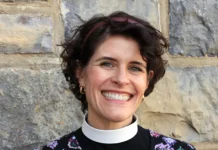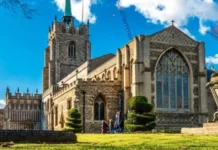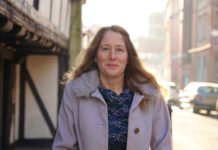The Archbishops’ Council is committed to developing fully independent scrutiny of safeguarding within the Church of England, to ensure the Church is a safer place for all. This principle was agreed in the run-up to the publication of the report of the Independent Inquiry into Child Sexual Abuse (IICSA) into the Anglican Church in England Wales in 2020.
It is therefore with regret that the Council has come to the reluctant conclusion that, despite extensive efforts over recent months, working relationships between two members of the Independent Safeguarding Board (ISB) and the Council have broken down.
The Board – made up of a chair, a Survivor Advocate and a third member – was set up by the Archbishops’ Council in 2021 as the first step towards a new system of independent scrutiny and the intention was always to move to a second phase.
It has been widely reported that there has been a dispute between two members of the ISB and the Council. Members of the Council and our experienced safeguarding professionals have been working constructively over recent months to put the ISB on a more sustainable footing.
Nevertheless, it has now become clear that that this is no longer viable with its current membership and that the dispute itself risks getting in the way of that urgent priority of moving to the next phase of establishing a new independent safeguarding body.
The Council has therefore agreed a reset. This will involve ending the contracts of two of the members of the Board, Jasvinder Sanghera and Steve Reeves, and of the acting Chair, Meg Munn.
The Council will be putting in place interim arrangements to continue the independent oversight of existing case reviews.
Those reviews will be carried out by independent experts qualified to conduct case reviews, just as at present, and they will be independently commissioned.
In the very immediate future, we have asked Meg Munn to provide business continuity for the remaining business of this phase of the ISB’s work. Case reviews will be overseen by one or more independent chairs of Diocesan Safeguarding Advisory Panels.
The Council will then move swiftly towards the second phase of independent scrutiny. We want to listen to all those with an interest, to learn the lessons of the work of the ISB in the last two years, and to find a way forward to establishing independent scrutiny on a firmer basis. We will engage with victims and survivors, with other independent voices, and with safeguarding professionals inside and outside the Church, to work with the Archbishops’ Council to design a permanent independent oversight structure.
The Council recognises that this news will be concerning and unsettling to victims, survivors and others. Members of the Council will be arranging an opportunity to meet with victims and survivors to hear concerns and discuss the situation.
The Archbishop of Canterbury, Justin Welby, and Archbishop of York, Stephen Cottrell, said: “We bitterly regret that we have reached this point and the Archbishops’ Council has not reached this decision lightly. We know this is a serious setback and we do not shy away from that – we lament it.
“But it is clear that there is no prospect of resolving the disagreement and that it is getting in the way of the vital work of serving victims and survivors. So the Council has very reluctantly concluded that we need a reset so that we can move swiftly towards a new scrutiny body that is fully independent of the Church.
“And in the immediate term we want to reassure victims and survivors that the work of independent case reviews will not stop.
“We recognise that this dispute has damaged confidence. But we believe this is the only way to get independent oversight of safeguarding back on track and move forward as quickly as we can.
“We also recognise that there are lessons for the Archbishops’ Council to learn from this and it is essential that we do so for the future.
“Most of all we must not lose sight of those for whom the delivery of independent oversight is crucial – the survivors and victims of abuse – and, more widely, all those who come in contact with the Church and who place their trust in us to deliver the highest standards of safeguarding.
“We sincerely want to thank all members of the Board for their service. Professor Maggie Atkinson, the former Chair, Jasvinder Sanghera and Steve Reeves have been committed to improving safeguarding on behalf of vulnerable people across the Church.
“We also particularly want to thank Meg Munn, who stepped in at our request to be acting Chair of the Board when it was without a Chair, and who has sought to strengthen the Board’s work.
“Independent oversight of the Church of England’s safeguarding is an urgent and indispensable first step away from the suspicion of marking our own homework.
“Additionally – we personally believe that we must make rapid progress towards our existing and excellent National Safeguarding Team being functionally independent in order to start to build confidence among survivors.
“At the local Diocesan level further thought is needed, so that Diocesan Safeguarding Officers are sure they can act independently.
“They are dedicated people committed to survivors and victims and deserve the trust of the Church.”
Finding support
If you or anyone you are in contact with wish to talk to someone independently please call the Safe Spaces helpline on 0300 303 1056 or visit www.safespacesenglandandwales.org.uk
Alternatively, you may wish to contact the diocesan safeguarding team in your area or the National Safeguarding Team – email safeguarding@churchofengland.org



